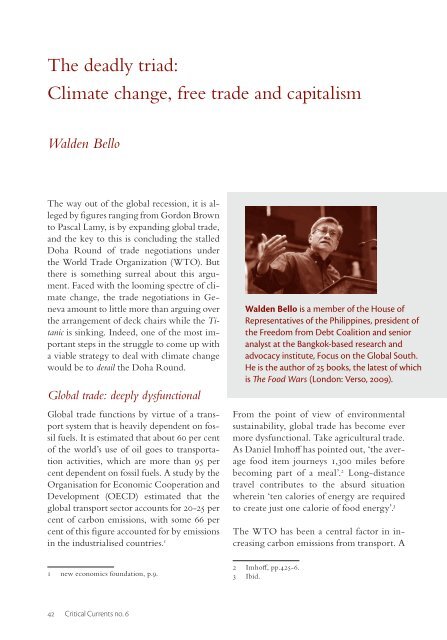Contours of Climate Justice - Dag Hammarskjöld Foundation
Contours of Climate Justice - Dag Hammarskjöld Foundation
Contours of Climate Justice - Dag Hammarskjöld Foundation
Create successful ePaper yourself
Turn your PDF publications into a flip-book with our unique Google optimized e-Paper software.
The deadly triad:<br />
<strong>Climate</strong> change, free trade and capitalism<br />
Walden Bello<br />
The way out <strong>of</strong> the global recession, it is alleged<br />
by fi gures ranging from Gordon Brown<br />
to Pascal Lamy, is by expanding global trade,<br />
and the key to this is concluding the stalled<br />
Doha Round <strong>of</strong> trade negotiations under<br />
the World Trade Organization (WTO). But<br />
there is something surreal about this argument.<br />
Faced with the looming spectre <strong>of</strong> climate<br />
change, the trade negotiations in Geneva<br />
amount to little more than arguing over<br />
the arrangement <strong>of</strong> deck chairs while the Titanic<br />
is sinking. Indeed, one <strong>of</strong> the most important<br />
steps in the struggle to come up with<br />
a viable strategy to deal with climate change<br />
would be to derail the Doha Round.<br />
Global trade: deeply dysfunctional<br />
Global trade functions by virtue <strong>of</strong> a transport<br />
system that is heavily dependent on fossil<br />
fuels. It is estimated that about 60 per cent<br />
<strong>of</strong> the world’s use <strong>of</strong> oil goes to transportation<br />
activities, which are more than 95 per<br />
cent dependent on fossil fuels. A study by the<br />
Organisation for Economic Cooperation and<br />
Development (OECD) estimated that the<br />
global transport sector accounts for 20-25 per<br />
cent <strong>of</strong> carbon emissions, with some 66 per<br />
cent <strong>of</strong> this fi gure accounted for by emissions<br />
in the industrialised countries. 1<br />
1 new economics foundation, p.9.<br />
42 Critical Currents no. 6<br />
Walden Bello is a member <strong>of</strong> the House <strong>of</strong><br />
Representatives <strong>of</strong> the Philippines, president <strong>of</strong><br />
the Freedom from Debt Coalition and senior<br />
analyst at the Bangkok-based research and<br />
advocacy institute, Focus on the Global South.<br />
He is the author <strong>of</strong> 25 books, the latest <strong>of</strong> which<br />
is Th e Food Wars (London: Verso, 2009).<br />
From the point <strong>of</strong> view <strong>of</strong> environmental<br />
sustainability, global trade has become ever<br />
more dysfunctional. Take agricultural trade.<br />
As Daniel Imh<strong>of</strong>f has pointed out, ‘the average<br />
food item journeys 1,300 miles before<br />
becoming part <strong>of</strong> a meal’. 2 Long-distance<br />
travel contributes to the absurd situation<br />
wherein ‘ten calories <strong>of</strong> energy are required<br />
to create just one calorie <strong>of</strong> food energy’. 3<br />
The WTO has been a central factor in increasing<br />
carbon emissions from transport. A<br />
2 Imh<strong>of</strong>f , pp.425-6.<br />
3 Ibid.
















